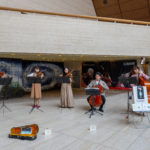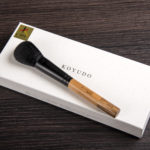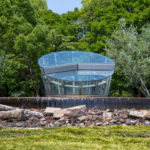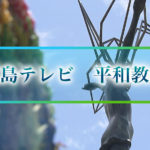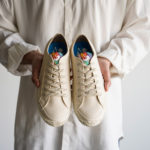So that the same mistakes will not be made; “Hiroshima Studies” cultivates the power to share thoughts of peace with the world
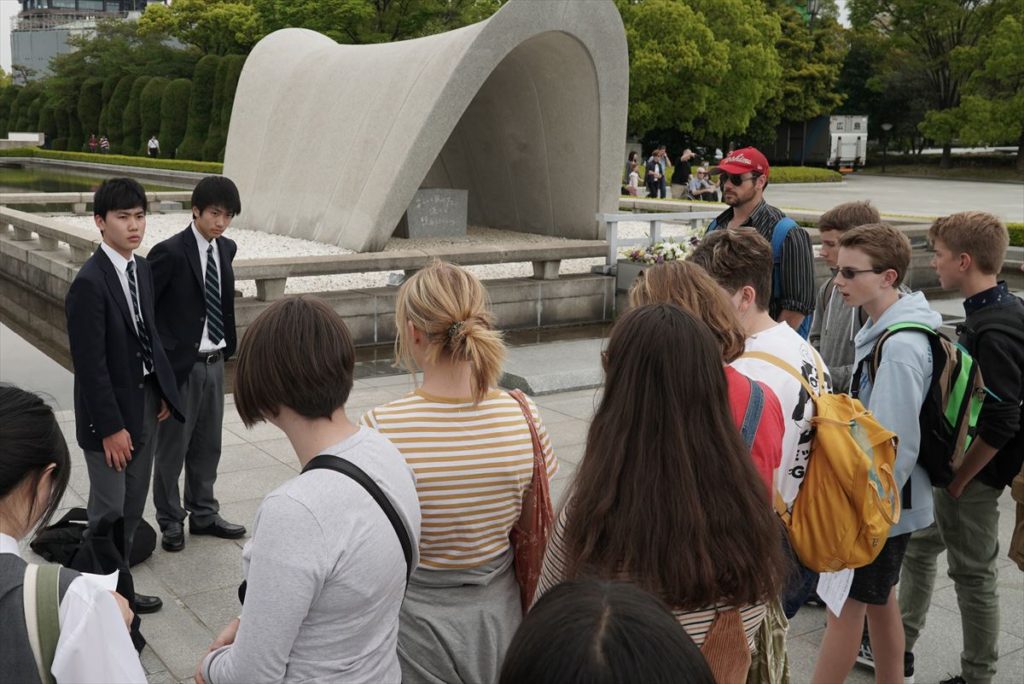
Are you in favor of or against Japan having nuclear weapons? This is theme of the debate that was conducted in a lesson called “Hiroshima Studies” for second-year students of the Global Studies Course at Takeda Senior High School in Kurose, Higashihiroshima. The Global Studies Course consists of Hiroshima Studies lessons for the first- and second-year students and Peace Studies for the third-year students held concurrently with the general education curriculum in which students objectively think about peace and accumulate experience in which they share their own opinions.
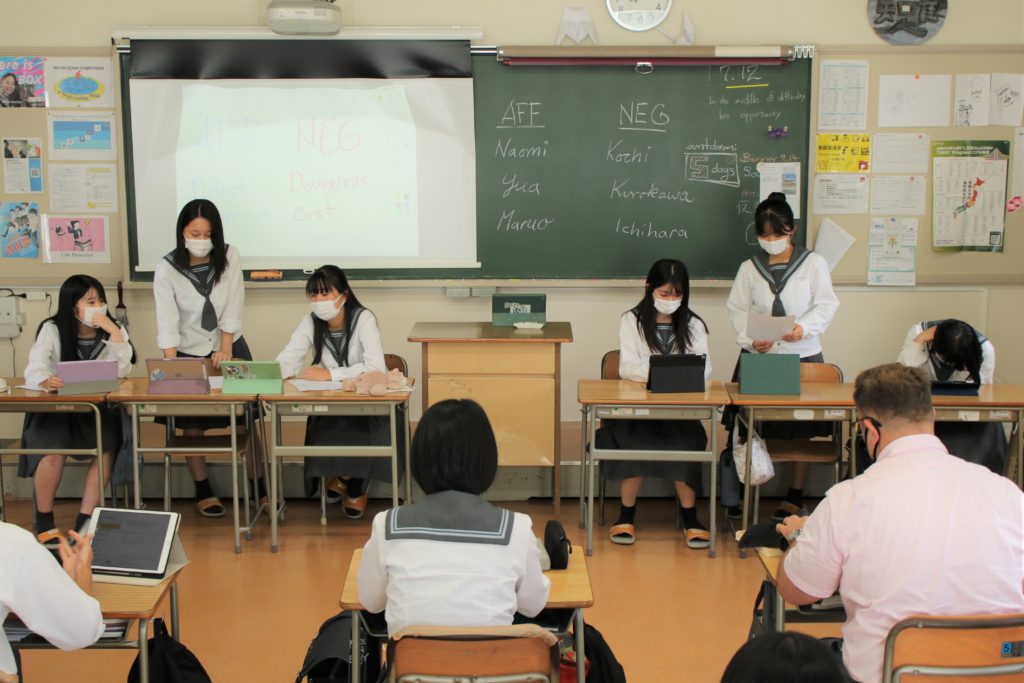
Second-year students conducting a debate
The Global Studies Course (hereafter the GS Course) started in 2018, one year after the 50th anniversary of the school’s establishment. Returning to the founding spirit of “nurturing international people who have a global perspective”, it was established as a course specializing in international education. Its distinctive curriculum includes the studying of two foreign languages, “Hiroshima Studies” to learn about what happened in Hiroshima, “Peace Studies” to think about peace from a global perspective, “Comparative Cultural Studies” with themes such as religion and intercultural communication, and so on.
According to the vice-principal Hotta Muneo, who was involved in the design of the course, the start of Hiroshima Studies was largely influenced by the voices of the students as well. Before the GS Course was established, he was frequently told by students who had studied abroad, “I couldn’t answer when asked about Hiroshima.” “I couldn’t explain when asked about Japanese people’s religious views.” He says, “To become an international person who works internationally, other than acquiring English skills, one must also be able to think and share one’s thoughts in English. I strongly felt that if one is living in Hiroshima, then one must be able to talk about Hiroshima being bombed and have an opinion about peace.”
[First-year students learning the classroom]
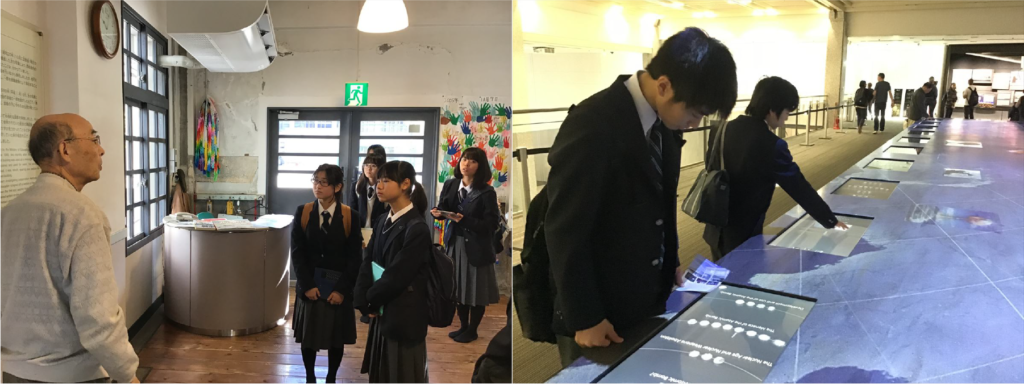
Visiting Fukuromachi Elementary School Peace Museum Studying at Hiroshima Peace Memorial Museum
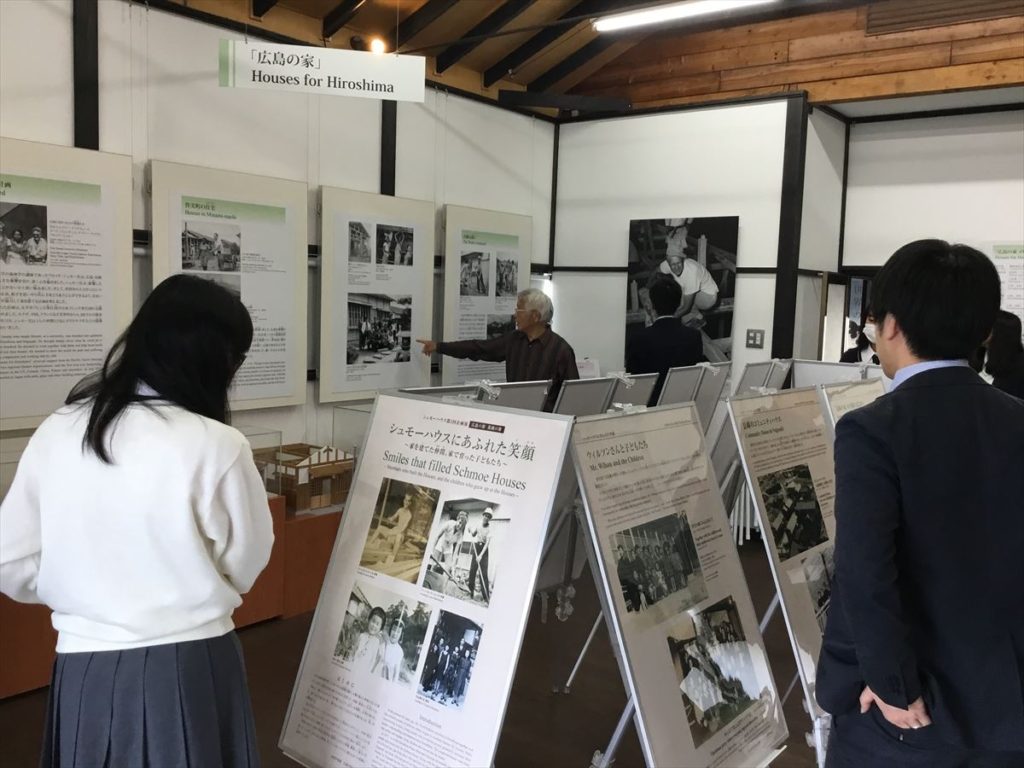
Visiting Schmoe House
[Second-year students learning outside the classroom]
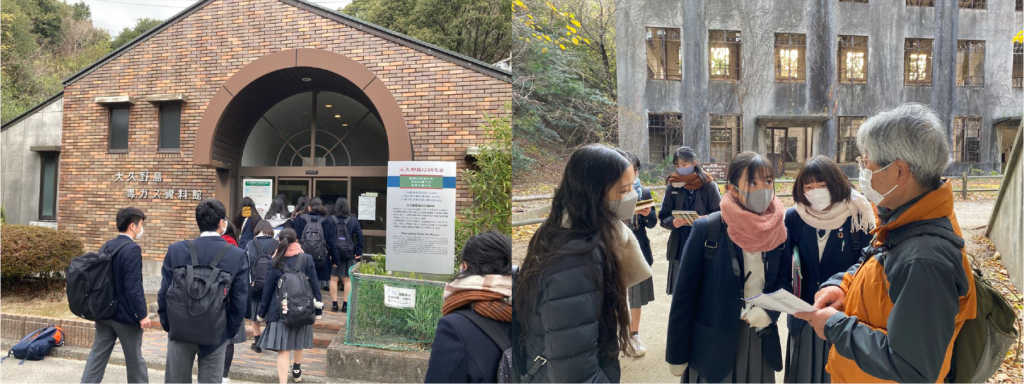
In the Okunoshima program, the students visit the Poison Gas Museum and remains that were created by poison gas
“Hiroshima Studies” starts with the first-year students learning about “Hiroshima”. They visit Fukuromachi Elementary School Peace Museum, the museum at Hiroshima Peace Memorial Park, the memorials, Eba’s Schmoe House, and so on to learn about Hiroshima’s history. When they become second-year students, in order to expand their perspective from just Hiroshima and instead think about peace from Japan’s perspective, they visit Okunoshima’s Poison Gas Museum and learn about how Japan was a victim as well as a perpetrator in World War II. In their third year, students start on “Peace Studies” and see Japan from a global perspective. For example, this year, exchange students from Germany enrolled in the GS Course, Mr. Ashley Souther, a teacher from the United States who is in charge of this course, and Japanese students think about peace from perspectives different from their own through discussions held as people from three different countries.
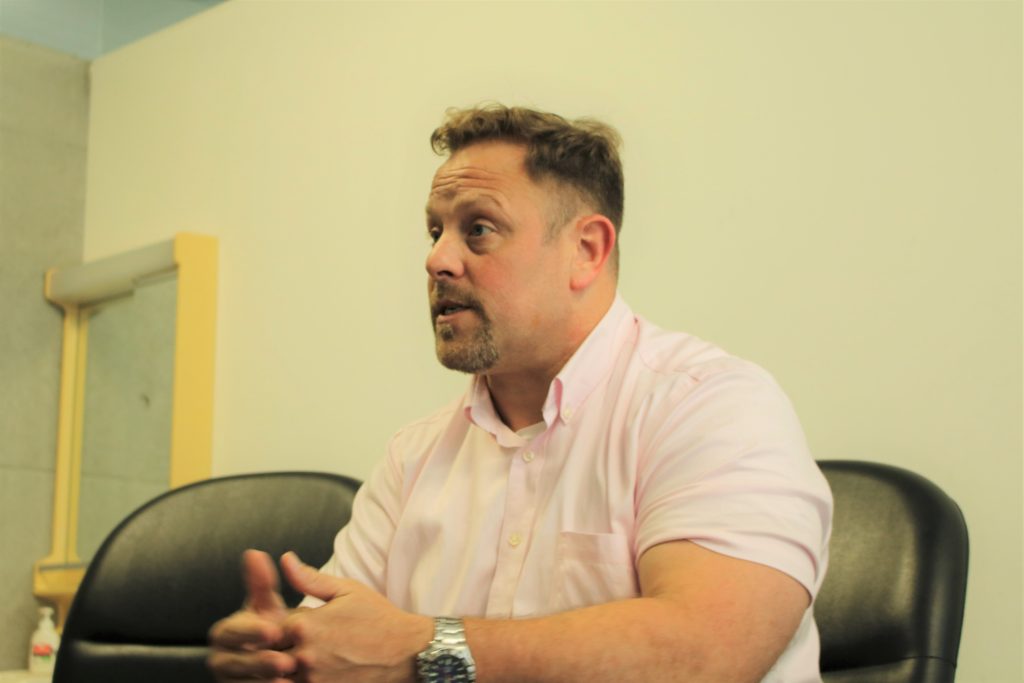
Mr. Souther, who is in charge of Hiroshima Studies
Mr. Souther was born in the United States and came to Hiroshima as an ALT(Assistant Language Teacher). He majored in Peacebuilding at American University’s graduate school and was posted to Takeda Senior High School in 2007. Currently, while teaching, he is also studying Peace Studies in the master’s program of Hiroshima City University. He says that when he was first posted to Hiroshima, he was unable to go to the Peace Memorial Park. He looks back on that time, saying, “I couldn’t find it in my heart, as someone from the country who had dropped the atomic bomb. But when I went to the Peace Memorial Park, instead of a message of who was wrong and which side was wrong, I found words that portrayed the war as the mistakes of humans. While emphasizing our shared humanity, war was portrayed in an objective manner, which allowed me to start thinking about peace.” For that, he emphasizes, “We have to learn about Hiroshima and learn from the past. I want the students to gain the ability to talk about peace logically.”
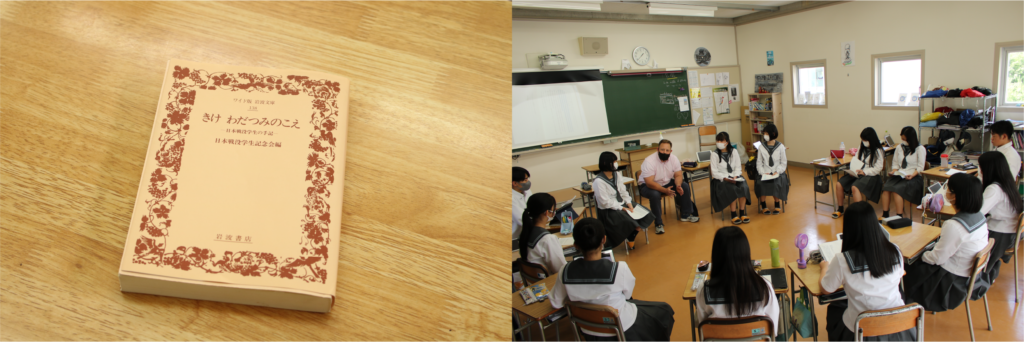
Reading “Listen to the Voices From the Sea” and presenting each person’s thoughts on it
On the day of the interview, the Hiroshima Studies lesson for second-year students started with them presenting their thoughts on “Listen to the Voices From the Sea”, a book that they had read in advance. Each person’s areas of interest were different and even for the same areas, they had differing opinions. Ms. Kochi Seira, a second-year student, says, “By exchanging opinions, I can learn about ways of thinking that I don’t have and learn more deeply about the themes that we are studying.”
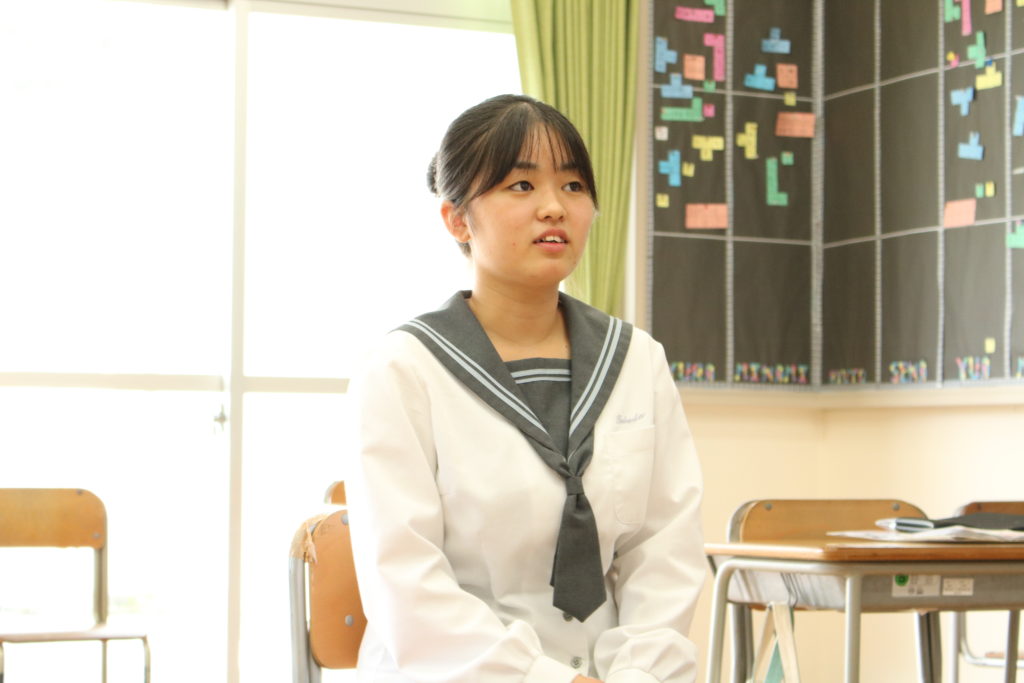
Ms. Kochi Sera
The lesson then turns into a debate. The students are divided into those “in favor of” and those “against” Japan having nuclear weapons and each side argues, questions, and closes off in English. The students who are watching judge which side had more persuasive assertions. Ms. Mizuguchi Naomi, a second-year student who spoke as someone in favor of having nuclear weapons, was originally against it. She was able to experience looking at herself objectively, saying, “When I first started preparing for the debate, I was unable to understand how to think and couldn’t think of anything to argue. As I researched, I learned about the way of thinking that having nuclear weapons can stop a war from happening. By thinking about questions for those against it, I was able to logically understand my own thoughts as someone who was originally against it as well.”
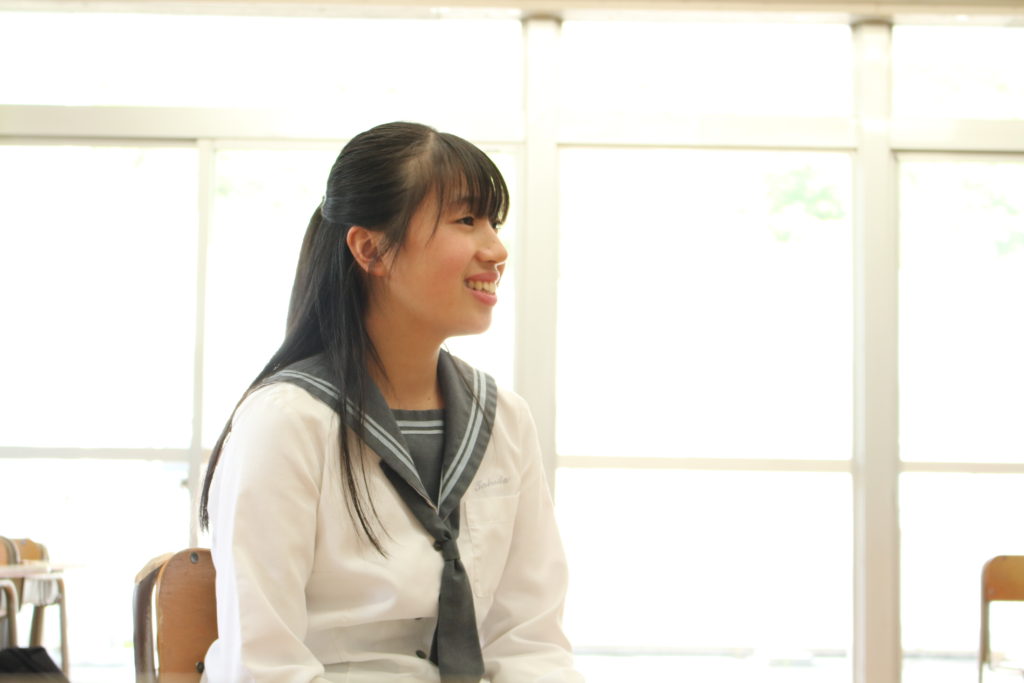
Ms. Mizuguchi Naomi
“By listening to the teacher and doing my own research, I became able to understand news that I had thought I could not understand because the contents were too complicated. A lot more information is coming in now than in the past,” says Ms. Kochi. Ms. Mizuguchi says, “I learned that thinking about peace in Hiroshima also leads to thinking about global problems as well, and my perspective has expanded.”
Through Hiroshima Studies, Takeda Senior High School hopes for its students to acquire the ability to share their own thoughts no matter the sort of environment or circumstances they are in. So that humanity will not repeat the same mistakes ever again.
The study of Hiroshima Studies thus continues.
Takeda Senior High School
443-5 Otada, Kurosecho, Higashihiroshima City, Hiroshima Prefecture
Tags associated with this article



